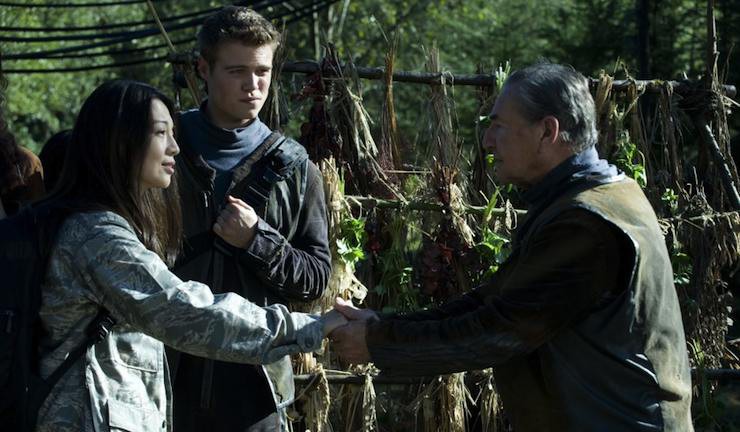Stargate Universe Season 2
Executive producers: Robert C. Cooper, Brad Wright, Joseph Malozzi, Paul Mullie
Original air dates: September 28, 2010 – May 9, 2011
Mission briefing. Telford survived his shootout with Kiva, which is more than can be said for Kiva. Her replacement, Dannic, is nuts, and can’t even keep his own people’s loyalty. Johansen is wounded by gunfire, and loses her baby, though she experiences a vision of the baby being rescued by the crew who stayed on Eden. The stones are used to bring medical personnel on board to heal the wounded.
In the end, the Lucian Alliance surrenders after Dannic is killed by Ginn, one of the other Alliance members. Most of the Alliance members are stranded on a planet, with only a handful kept on board at the request of the IOA because they have intelligence about a Lucian Alliance attack on Earth. Varro and Ginn cooperate with the crew and the IOA—Simeon does not, feeding false intel to Earth. He’s surprised when Varro informs him that the others really are cooperating. Realizing his position is untenable, he kills Ginn—who’s from the same planet as him and could give away secrets about him—but Ginn is using the stones, having switched with Perry so she can work on the FTL drive with Rush. The result is that both Ginn and Perry are killed, which devastates Eli (who’d started a relationship with Ginn) and Rush (to whom Perry meant a great deal). Rush kills Simeon in revenge.
Chloe has recovered completely from her gunshot wounds, and what’s more she’s showing preternatural understanding of things outside her knowledge. It’s clear the Nakai did something to her. She uses that connection to help save the ship, and later they bargain with the Nakai to remove the alien influence, though Rush is more than happy to take advantage of her improved intellect on more than one occasion.
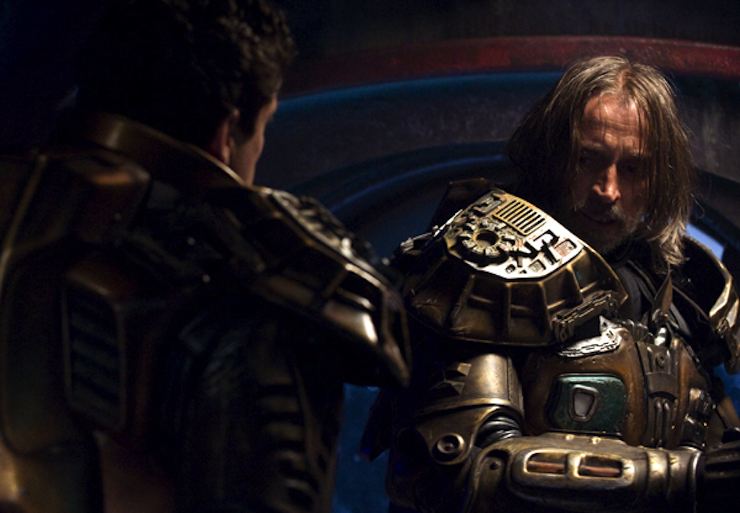
Rush discovers the ship’s bridge, but keeps it from the rest of the crew for a while—when it is revealed, Eli blows up at him. While playing on the bridge, he sees hallucinations of his dead wife, as well as of Franklin, who still hasn’t been seen since he sat in the control chair and then disappeared.
Eventually, it’s revealed that Destiny can send images directly into the minds of the crew when it mentally sends Young through a bunch of no-win scenarios to see how he’ll respond and to see if he’s fit for command. This also explains Rush’s hallucinations—and also, to Johansen’s horror, her visions of her child being saved, as her baby wasn’t taken to Eden. Indeed, the folks who went to Eden all died once winter hit (except for one woman who died when a tree fell on her because the guy cutting the tree down was too stupid to notice she was there). The aliens who created the world didn’t save them, but did send their shuttle back to Destiny intact, along with zombie versions of the crew who lived just long enough to explain what happened before dying again the same way a second time. Fun folks, those aliens.
Rush discovers what Destiny‘s mission is: there’s a pattern to the background cosmic radiation of the universe that may point to a design or an intelligence. He’s more determined than ever to see the mission through.
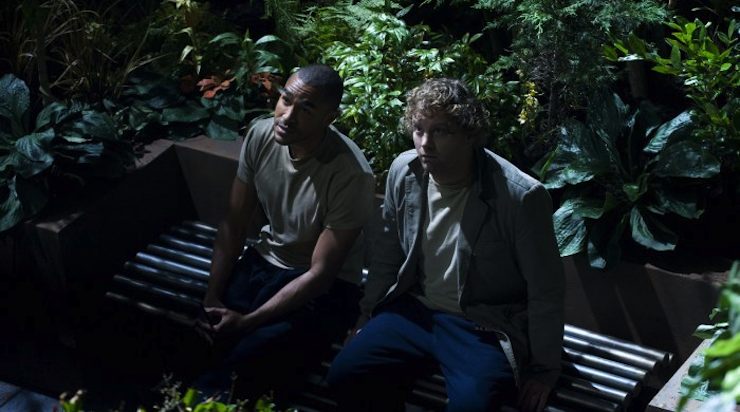
With more and more of the database being unlocked and translated, Johansen has much more medical knowledge and equipment than ever before—which is handy when she realizes that Volker has kidney disease and she has to perform a transplant of one of Greer’s kidneys to Volker.
The crew encounters one of the seed ships the Ancients sent ahead of Destiny, but there are also other aliens on board. Telford gets stuck with them for a while, but eventually he makes friends with them, and they team up against a mess of drone weapons. Left over from a war that ended millennia ago, these drones identify a target and destroy it. Destiny finds itself going up against those drones more than once, barely making it out alive…
Eli and Ginn had come up with a way to use a sun’s power to dial a nine-chevron address and maybe get back home. However, before they can try it, they meet a Rush from twelve hours in the future, who informs them that they tried it and it didn’t work. Telford got through to Earth, but a solar flare hit and everyone else went through the gate and disappeared, not appearing on Earth or anywhere else. Destiny itself also went back twelve hours in time and was destroyed, with only Rush left on board, having taken a shuttle. The future Rush accidentally kills Telford and then dies himself. However, the future Telford is still alive and on Earth.
The rest of the future crew also survived, winding up on a planet two thousand years in the past. They eventually form an entire interplanetary civilization called Novus, one that Destiny comes across remnants of, including Kino footage of their alternate selves putting a colony together and creating the nascent civilization.
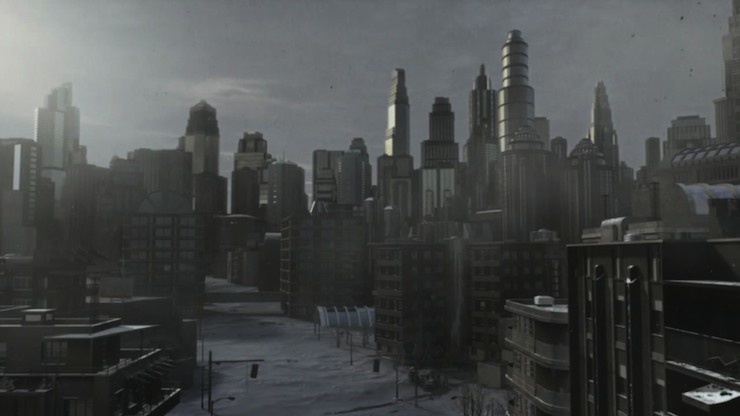
The senator who has replaced Armstrong as the head of the committee that approves Stargate Command stuff is using the stones to visit Destiny, but the Lucian Alliance attack happens on Earth at the same time, leaving Wray and Greer stuck in the senator and a scientist’s bodies when the Pentagon is hit. Aided by Telford, they manage to find the bomb that will destroy most of Washington, and with Varro’s help, the device is defused, though it means the death of both the senator and the scientist, as they’ve been exposed to fatal radiation.
McKay has figured out a way to dial Destiny without the risks that destroyed the last two worlds that dialed the ship. Woolsey, Telford, and McKay try to convince Langara to let them use their gate, but the Langaran ambassador is reluctant to do so without their scientists going over the data. Telford is convinced that Langara has gotten into bed with the Lucian Alliance—but that turns out not to be the case, and Earth’s relationship with Langara is permanently damaged, with the added bonus that they won’t let Earth use their Stargate to dial Destiny any time soon.
Planetary exploration continues to have its joys, from one world on which Scott gets a strange growth that gives him hallucinations of a happy life back on Earth to another in which Johansen and Corporal Reynolds are captured by hunting aliens.
Eli and Brody find stasis pods, most of which actually work. This proves useful when the drones prove to be a tenacious foe. They set up a blockade at any and every possible star they would use to recharge and at every planet they would use for resupply. They solve the first problem by going to a blue giant to recharge, which requires that all but three people wearing EVA suits abandon ship, as it gets way too hot in that star. The procedure winds up leaving Park blinded.
The resupply issue is still a big one, so they decide to shut down life support after putting everyone in stasis pods until Destiny reaches the next galaxy, which doesn’t have any drones in it (they hope). However, as Young, Rush, and Eli prepare to be the last three to go into stasis, they realize that one pod is busted. Eli insists that he stay to repair it, as he’s the smartest person on the ship. Young and Rush go into stasis, leaving Eli alone on the ship…
Best episode: “Visitation,” which corrects the mistake made in “Faith” by showing that not only were the visitors to Eden stupid, they were incredibly stupid. The show in general has a tendency to only go halfway in terms of the awful consequences of being as stranded as they are, but “Visitation” made it clear just how difficult and unforgiving the unknown can be, and how small the margin for error is.
Runners-up: “Pathogen,” which beautifully explores the difficulties faced by those they left behind. It’s a great character study of Wray, of Eli, of Walker, and of Marian Wallace. Best is the ending, which lets Marian see Destiny and which puts Walker and Marian together to help each other out.
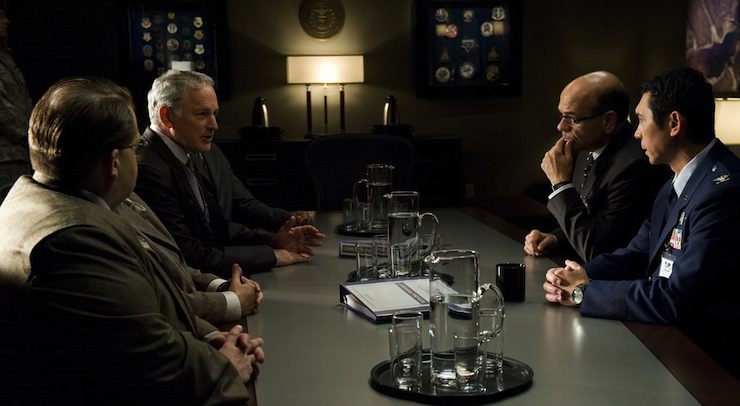
“Seizure,” which ties nicely into SG-1 (Langara) and Atlantis (Woolsey and McKay), and also is a clever use of the stones in a covert op. Besides, what’s not to love in an episode that includes David Hewlett and Robert Picardo and Victor Garber?
“Common Descent” and “Epilogue,” which are touching and fascinating looks at the result of time-travel shenanigans, showing us what the crew is capable of without Rush and without Destiny.
Worst episode: “The Greater Good” and “Malice,” which are the episodes that got me to stop watching Universe back in 2010. Robert Knepper is delightfully evil as Simeon, but his murder of Ginn was so tiresomely predictable, and then they doubled down on it by pairing Eli with Ginn and having the stones be part of the equation thus also killing Perry. Because the people on the ship aren’t depressed enough, we have to kill off the lovers of the two most interesting characters on the show. Blah.
Runners-up: “Hope,” which compounds the problem by bringing Ginn and Perry back as virtual presences inside Destiny‘s computer, thus cutting off the tragedy at the knees. (And then we get it all back again when Eli has to shut them both off in “Seizure.” Wheeee!) As an added bonus, we have a medtech performing a kidney transplant successfully, which is totally convincing.
Can’t we just reverse the polarity? The drones are single-minded and adaptable. It’s not a surprise that they were useful weapons in a war, but damn, they are relentless…
My life’s work was to be here. Rush sees hallucinations of his dead wife (because he wasn’t enough like Baltar, we had to throw in a virtual blonde for him to talk to), admits that he loves Perry, sees Perry get killed, gets revenge, meets his twelve-hour-older self, and also continues to be a dick to everyone, up to and including keeping his discovery of the bridge a secret for as long as he can get away with.
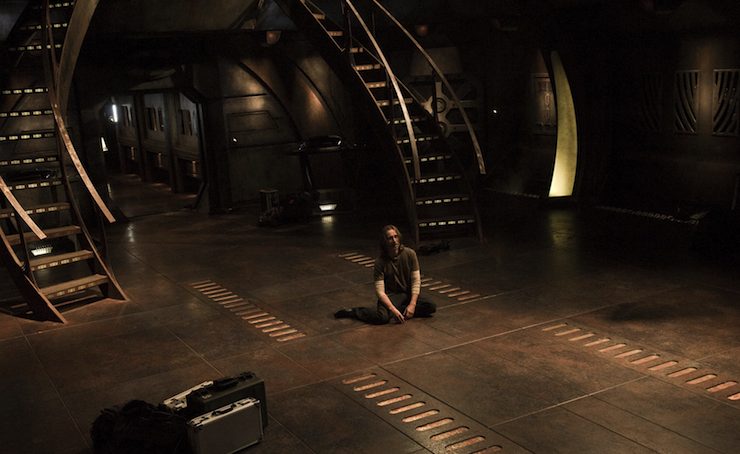
You are here. Eli and Wray convince Stargate Command to give Marian clearance to know about the project (Wray’s argument is that he solved the ninth chevron and may be the most important person in the SGC). When they think they’re going home, Johansen and James are convinced that Eli will become one of the scientific rock stars of the SGC, right alongside Carter, Jackson, and McKay. In the end, when he’s talking Young into letting him be the one to stay out of stasis, Eli is finally ready to say out loud that he’s smarter than Rush.
In our society, the military takes orders from civilian leadership. Wray is only able to hold on because she knows Walker is waiting for her back home. Walker herself is having more than a little trouble with it, mostly taking refuge in lots and lots of wine. The other Wray is the last of the original crew to die, and we see her as an old woman giving a heartfelt speech to the Novus colony.
I know everything about everything. McKay has figured out a way to dial the ninth chevron without any risk to the planet the Stargate doing the dialing is on. He is unable to test the theory, and indeed he convinces Young to abort the mission before Earth’s relationship with Langara is totally hosed. He also gets into an entertaining argument with Eli over higher math.
Wayward home for out-of-work genre actors. Supernatural‘s Julie McNiven takes on the recurring role of Ginn. French Stewart—who played Feretti in the original Stargate movie—comes back to play a scientist in “Alliances,” making him the fourth actor from the original film to return on a TV series. (Erick Avari and Alexis Cruz reprised their roles on SG-1. Richard Kind, like Stewart, appeared as a different character.) The great Victor Garber joins Robert Picardo and David Hewlett in “Seizure.”
And we have the best Robert Knepper moment ever: the actual Robert Knepper! He recurs as Simeon through the first half of the season.
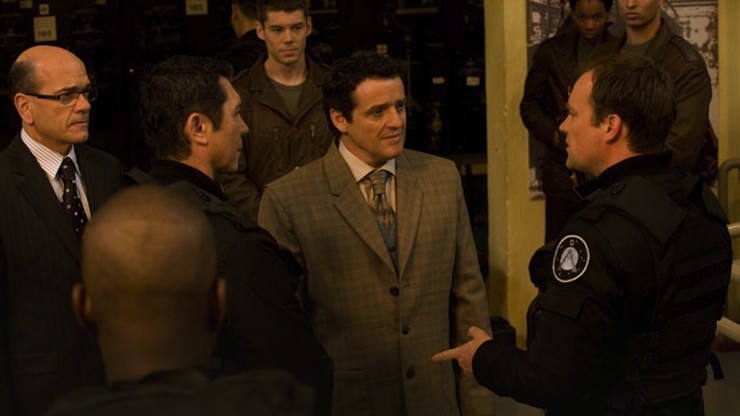
Trivial matters. This is, obviously, the final season of any bit of the Stargate franchise, and so has the final appearances of all the Universe crew, as well as Stargate regulars Lee, Woolsey, and McKay.
Langara was established back in SG-1‘s “Meridian” as having veins of naquadria, and a Langaran native, Jonas Quinn, was part of SG-1 for a year in its sixth season. Solar flares were established as causing the Stargate to become a temporary time machine in SG-1‘s “1969,” and was seen most recently in “Time” and Continuum.
Woolsey and McKay’s appearances in “Seizure” give no indication one way or the other of the fate of the Atlantis expedition, though even if the city was returned to the Pegasus galaxy, they have lotsa ZPMs now and could easily gate home as needed. (It makes sense for McKay to work on solving the problem anyhow, since the ninth chevron was discovered in Atlantis’s database.)
The Telford who survives is from twelve hours in his future, making him—like O’Brien on Star Trek: Deep Space Nine after “Visionary“—permanently out of sync with his own time.
“Cloverdale” was an amusing in-joke, as the town of Cloverdale, British Columbia—a suburb of Vancouver—is often used as the set for a small town in shows filmed in B.C. Indeed, the town was used as the exterior set for the titular town in Smallville. For once, they could film there without having to change any of the signage!
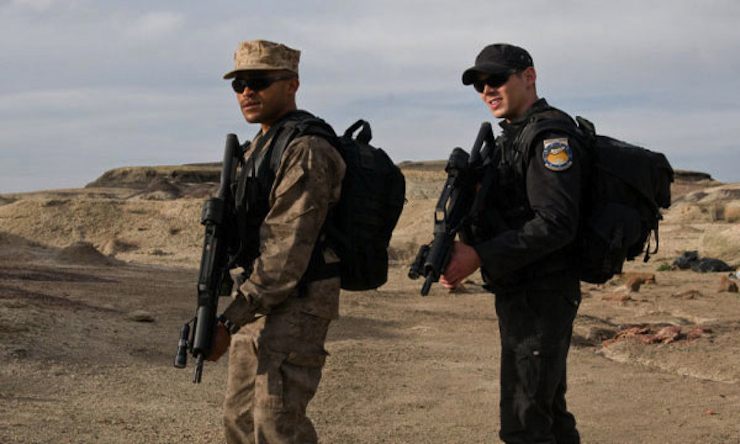
The first member of the Novus colony to die is Volker, as that version of him did not have Destiny‘s medical facilities, and so he died of the kidney infection that Johansen was able to save him from thanks to a transplant from Greer.
Chevron seven nine locked. You know, lots of people like to say that the show picked up in season two. And there are aspects of season two that are a lot better than season one. Eli’s maturation continues apace, and David Blue continues to be one of the absolute bright spots of the series. Greer is much less the angry young man, which had grown tiresome, and he more embraces his role as Master Sergeant; he’s the guy who takes care of everyone else, seen most aggressively in “Cloverdale” when he defends Scott and Chloe until they’re safe to go back to Destiny, and also in “Hope” where he is unhesitating in his willingness to give up a kidney for Volker (not to mention his taking Volker to hydroponics to simulate his backyard growing up). Johansen also gets some meaty storylines, from her anguish over losing her child to being forced to be more of a doctor than a medtech—though, again, I totally didn’t buy that she successfully did a kidney transplant. In addition, the troika of Park, Brody, and Volker get to be a bit more than just the three people Rush yells at.
But there still isn’t a whole lot to like here. The unrelenting despair is just exhausting, to the point where it just stops having an effect. We never find out why, exactly, the Lucian Alliance finds being trapped on Destiny without sufficient supplies or control is such a nifty idea that they sent a team last season and are trying to convince the Langarans to send them another. Chloe’s alien alterations are a desperate attempt to do something, anything, with a character who’s otherwise useless. Scott is marginalized in favor of Young, which is understandable from a storytelling perspective, as Young’s the one in charge, but Scott is so much more interesting than Young (“Cloverdale” is of far more use and interest than “Trial and Error,” which mostly points up how dreadful Young is at his job) and Brian J. Smith is so much better an actor than Louis Ferreira that it feels like a mistake.
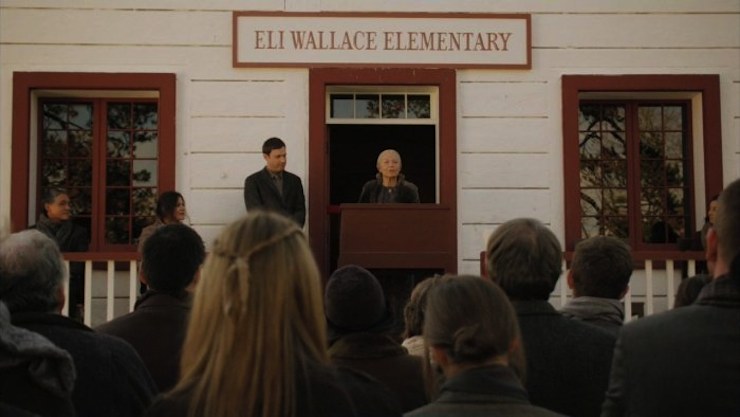
We also start seeing the crew embracing their mission in what feels like a constructed attempt to make them not want to go home, which is in no way convincing coming from anyone other than Rush and Young. Volker said in “Hope” that there was nowhere he’d rather be as he’s about to get a kidney transplant from a medtech, and I just do not believe him. The rest of them are far from home, have almost died dozens of times, have seen bunches of their crewmates die horribly, and you expect me to believe that any of them like it?
The only exceptions are Rush, who is obsessed with Destiny, and Young, who probably doesn’t feel he has anything to go home to at this point. (And he’s probably right, as the only thing awaiting him on Earth is a court martial and divorce proceedings.)
I do love the fate of the time-displaced Destiny crew, and the looks at the Novus colony are a joy to watch, from the early struggles to the schisms to the pairing off as they realize they need to have lots of babies in order to be viable. (My favorite was the elderly Brody bitching about these kids today and how they should get off his lawn.) But ultimately that comes across as a look at the TV show that was more interesting than the one they actually aired.
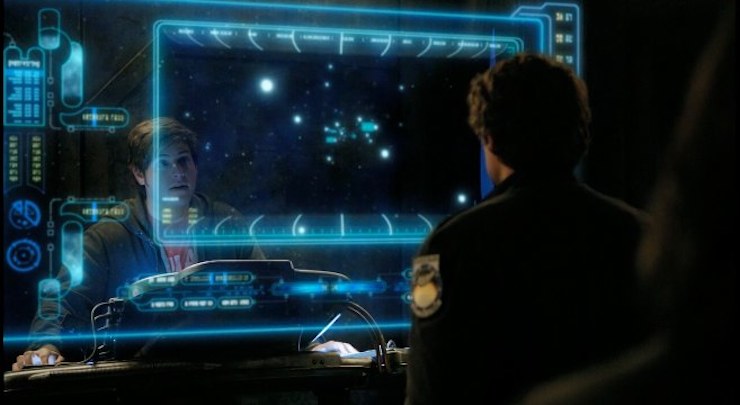
Keith R.A. DeCandido is at RocCon in Rochester, New York this weekend, alongside Stargate actor Ona Grauer, Star Trek actors Marina Sirtis and J.G. Hertzler, fellow authors Lois Gresh, Jeremy Kahn, and Alec Frasier, and more. Keith will have a table in the dealer room, so come on by and say hi! (And, y’know, buy a book or twelve…)










